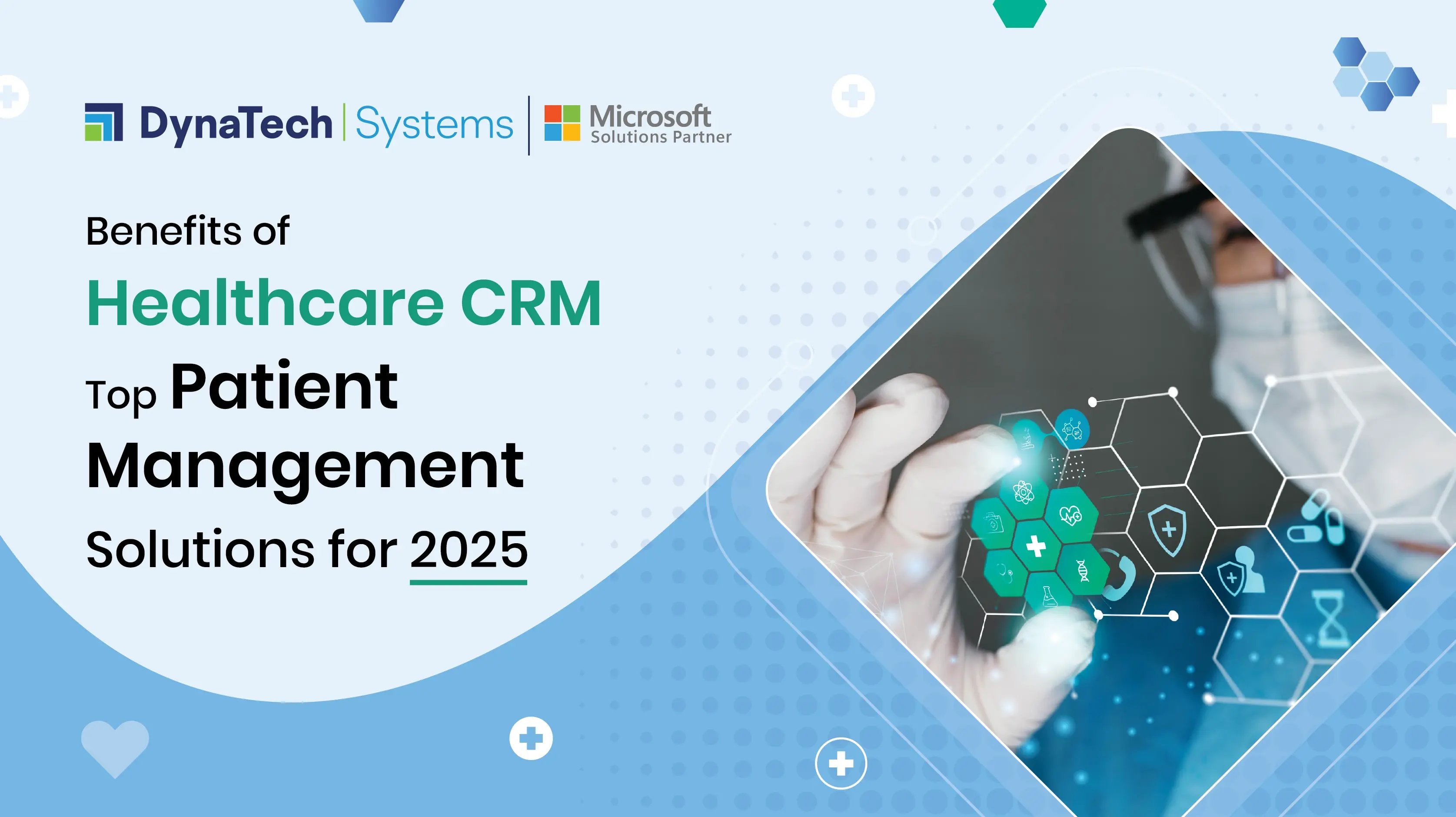Behind every delightful healthcare experience is a well-organized system that ensures patients receive timely, personalized, and efficient care. But without suitable tools, medical practices and hospitals frequently struggle with scattered patient data, inefficient workflows, and gaps in communication which causes frustration for both patients and healthcare experts.
A Healthcare CRM changes this by bringing everything together in one unified place. More than just a database, it's a rigorous tool that rationalizes patient engagement, automates workflows and makes care coordination better. Among the most preferable solutions, Dynamics 365 for healthcare stands out for its ability to centralize patient information, integrate with existing systems, and simplify operations—all while ensuring compliance with healthcare industry standards.
However, with so many choices, choosing the right CRM that fits into your healthcare practice can be a painstaking task. Hence, in this blog, we will break down the supreme benefits, explore the best CRM for healthcare, and highlight top patient management solutions for 2025. This will help you navigate the future of healthcare with confidence.
Key Benefits of CRM for Healthcare
1. Elevating Patient Engagement & Experience
Patients today expect smooth, distinctive interactions with their healthcare experts. A CRM for healthcare ensures every touchpoint is meaningful by:
- Sending automated appointment reminders to minimize no-shows and elevate scheduling efficiency.
- Give a personal touch to communication-based on the patient's medical history. This helps ensure more relevant and timely interactions.
- Offering immediate access to medical records and previous interactions terminates delays and disappointments.
- Creating a smooth, patient-centric experience drives trust and long-lasting relationships with customers.
With a CRM in place, healthcare professionals can move from reactive to proactive patient management by ensuring that every individual gets the care and attention they always look for.
2. Simplifying Operations with Smarter Workflows
Administrative bottlenecks can create barriers in healthcare providers' services, leading to inefficiencies, missed appointments, and patient dissatisfaction. A healthcare CRM helps them get rid of these challenges by automating time-taking tasks, this helps healthcare companies ensure a smoother, more organized workflow.
With a CRM, healthcare providers can:
- Automate appointment scheduling and rescheduling, minimizing manual effort and eliminating scheduling conflicts.
- Digitize patient records, ensuring faster access to vital information while eliminating paperwork.
- Streamline billing and payment processing, curtail errors, and improve financial precision.
- Automated follow-ups and reminders enable healthcare providers to ensure patients stay engaged with their care plans.
By coping up with these administrative tasks effectively, a healthcare CRM helps save a lot of valuable time—allowing medical professionals to shift their focus on other high priority operations that require their attention: delivering quality patient care.
3. Enabling Seamless Care Coordination
Efficient healthcare isn't merely about treatment—it's about smooth collaboration. In a restless medical environment, various medical specialists, nurses, and support staff require to stay aligned to provide the best possible care. A healthcare CRM ensures that everyone involved in a patient's journey has immediate access to the correct information, leading to faster decisions and better outcomes.
With an integrated CRM, healthcare teams can:
- Facilitate frictionless communication between doctors, nurses, and administrative staff, eliminating silos.
- Access real-time patient history and treatment plans, ensuring prudent decision-making at every stage of the process.
- Reduce redundant diagnostic tests, cutting down patient costs and unrequired delays.
- Improve care continuity, ensuring a highly customized and impactful treatment experience.
- By breaking down communication barriers, a healthcare CRM allows teams to work smarter, eventually delivering more coordinated, efficient, and patient-centric care.
4. Smarter Decisions with AI & Predictive Analytics
In healthcare, having the correct data at the right time can be the core reason for saving lives. A leading-age healthcare CRM powered by AI and predictive analytics converts raw data into actionable insights. This enables medical professionals to stay ahead of patient requirements and optimize care delivery.
With real-time analytics, healthcare providers can:
- Recognize at-risk patients early and enforce preventive care strategies to eliminate complications.
- Allocate resources more effectively, ensuring the ideal staff, equipment, and facilities are available when required.
- Examine patient flow and operational trends. This helps clinics and hospitals improve efficiency and minimize wait times.
- By making the most of data-driven insights, a CRM for healthcare empowers providers to move from reactive to proactive care, eventually improving patient outcomes and operational performance.
5. Ensuring HIPAA Compliance & Data Security
In healthcare, data privacy isn't optional—it's mandatory. Patient records contain highly confidential data, making security and regulatory compliance the highest priority. A CRM for healthcare ensures that medical data is secured, accessible only to authorized personnel, and fully compliant with HIPAA regulations.
The Best CRM solutions provide:
- Secure data storage and encryption, preventing unauthorized access and breaches.
- Role-based access controls help ensure that only authorized staff can view or modify patient records.
- Audit logs and compliance tracking, maintaining a transparent record of who accessed patient data and at what time.
Best Healthcare CRM Solutions for 2025
Selecting the right CRM depends on your organization's size, needs, and integration requirements. Here's a quick comparison of the top CRMs for healthcare:
|
CRM Solution |
Why Choose It? |
Key Features |
|
Dynamics 365 for Healthcare |
Best for scalability & Microsoft integration |
✅ 360° patient view ✅ AI-powered information✅ Smooth integration (Teams, Outlook, Power BI) |
|
Salesforce Health Cloud |
Suitable for patient relationship management |
✅ AI-driven analytics ✅ EHR integration ✅ Personalized workflows |
|
HubSpot for Healthcare |
Perfect for small & mid-sized practices |
✅ Automated patient outreach ✅ Easy & Effective dashboard ✅ Appointment Monitoring |
|
Zoho CRM for Healthcare |
Cost-efficient & highly customizable |
✅ Automated follow-ups ✅ Secure data handling ✅ Multi-channel communication |
Redefining Patient Care with Intelligent CRM
The future of healthcare is empowered by data, automation, and customized patient experiences. As patient expectations expand and the industry becomes more complex, healthcare providers can no longer merely depend on outdated systems to handle relationships and workflows. The ideal healthcare CRM is the foundation for delivering smooth, patient-centric care while making operational efficiency better.
Groundbreaking solutions such as Dynamics 365 for the Healthcare industry, Salesforce Health Cloud, and HubSpot empower medical practices with AI-powered information, automated workflows, and rigorous security. These tools go beyond ordinary record-keeping. They help healthcare providers boost patient engagement, minimize administrative encumbrance, and optimize care coordination across different departments.
In 2025 and beyond, funding in a robust healthcare CRM is not just about staying competitive—it’s about providing the highest standard of care while future-proofing your healthcare practice. The ideal technology ensures that every patient communication is valuable, data-driven, and effortlessly managed. This leads to favorable health outcomes, robust patient trust, and lasting success.




























